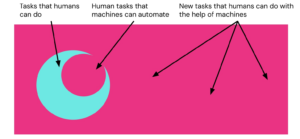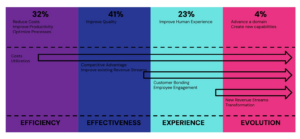What does the future of work look like in an AI-driven world? While nobody knows precisely, we can identify the key challenges and opportunities that lie ahead.
This article explores how we might shape this future to be more equitable, meaningful, and human-centered, creating systems that augment our capabilities rather than simply replacing human work.
Post-Cognitive Work: Reimagining Ownership and Value
The future of work will be hybrid or even “post-cognitive” – a collaboration between humans and machines. As individuals, teams, organizations, and communities increasingly teach these AI systems, we believe ownership and governance should be shared proportionally based on their contributions.
This raises an important question: Do AI systems represent “outcomes of work” that employers can rightfully claim based on employment contracts, or are they “a combination of individual and collective knowledge” that belongs partly to those who helped create them, the workers, and the data owners of frontier data? Additionally, what role would AI providers play? Ownership, governance, and access to frontier AI models are critical questions that cannot follow traditional software or cloud models without reflection.
From UBI to Post-Cognitive Equity
Many people sense the risk of obsolescence in their work and their skills and therefore perceive the future as economically insecure. Matt Prewitt of RadicalxChange compares the magnitude of this AI revolution to that of the industrial revolution 100 years ago. However he notes, we would need to learn from the disruption 100 years ago and make the transition to the new stable state smoother.
If individuals, teams, and organizations received a Post-Cognitive Income (PCI) from their AI systems, this would align incentives to jointly improve these technologies without the risk of making ourselves obsolete without compensation. It may even encourage us to automate our roles to advance to new challenges.
The idea of Universal Basic Income (UBI) was created for similar reasons, but it has proven not to be the last iteration. It lacks the concept of contributions and value creation, and the basis to create value to fund it continuously: equity, or assets. Therefore, Universal Basic Equity (UBE) is already an advancement.
Ownership in the technologies leveraging workers’ capabilities to automate and augment work by magnitudes seems even more appropriate. It may be time for Post-Cognitive Equity (PCE) in the form of collective AI ownership.
Tapir allows its members to collaborate on their frontier data in a privacy-preserving way to co-create and co-own data products, including AIs. Those data products are represented by Data-IP-Tokens that allow fractional ownership based on the collaborators’ contributions. Decentralized governance of those data products can be conducted based on the ownership of the Data-IP-Tokens via Quadratic Voting. However, there are minimal requirements every data product has to adhere to, and the design space is pre-defined by the Tapir platform and the stage in the lifecycle of a data product.
PCI or PCE could provide a solution to the anxiety of job loss and about unemployability. Deloitte’s 2025 Global Human Capital Trends report confirms this tension, emphasizing that technology’s value lies in replacing human labor and working more closely with humans to amplify their ability to discover and capture opportunities for innovation and growth.
This perspective is reinforced by findings from the World Economic Forum’s Future of Jobs Report 2025, which predicts that by 2030, the proportional share of tasks performed solely by humans will decline from 47% to 33%, with technology-performed tasks increasing from 22% to 34%, and human-machine collaborative tasks remaining steady at around 33%. However, this doesn’t mean humans will become obsolete – instead, the nature of work is evolving toward more collaborative and augmented approaches. But still this would disrupt work significantly and will require workers to learn new skills and adapt to this new future work. Are we prepared?
Augmentation beyond Automation
History shows that technological innovations have consistently created more work opportunities than they’ve eliminated. According to Erik Brynjolfsson, AI augmentation will far outpace automation in economic potential. This requires humans to think beyond limitations, leading to innovations in unexpected and less predictable areas.

Figure 1: The expanding frontier of human-machine collaboration. Source: inspired by Erik Brynjolfsson, AI Action Summit, Paris, 2025
As the diagram illustrates, the most significant potential lies not in automating existing human tasks but in creating new capabilities that humans can perform with machine assistance. AI will enable us to multiply our capabilities by guiding many “AI Servants” and let us think beyond human limitations to tackle unimaginable challenges.
The tradeoff is that people must adapt to rapidly changing work environments. We can’t predict with certainty what job roles will dominate 5-10 years from now, just as we couldn’t have predicted today’s landscape a decade ago.
As Deloitte’s 2025 Global Human Capital Trends report emphasizes, one of the key tensions organizations must navigate is finding the right balance between automation and augmentation. Automation focuses on efficiency and replacing human tasks, while augmentation enhances human capabilities and potential. The report notes that organizations should intentionally apply technology to create new value for the organization and the worker, citing examples like Shell’s use of AI to reengineer monitoring processes that allow humans to focus on priority activities.
Everest Group and Joseph Pine analyzed the goals that AI primarily helps to pursue. Their research reveals that efficiency (32%) and effectiveness (41%) dominate current AI initiatives, while experience enhancement (23%) and evolutionary transformation (4%) represent a smaller but growing focus.

Figure 2: Distribution of AI initiatives by goal category. Source: inspired by Everest Group, Joseph Pine II and Antonio Grasso
It seems natural for organizations to first improve existing processes before exploring transformative applications. We expect an organizational journey leading to more of these higher-impact use cases as organizational AI capabilities mature.
Evolving Human Capabilities: The Extended Mind
Human capabilities will have to evolve alongside technological advances. Technology will become more accessible and ubiquitous. Brain-Computer Interfaces (BCIs) will enable entirely new modes of thinking and unprecedented forms of intelligence.
Today, we primarily rely on our biological brains, with our digital devices serving as a minimal extension – perhaps 99% biological brain and 1% digital brain. This ratio might eventually flip to 1% biological and 99% digital, creating truly superhuman capabilities.
London Business School economist Andrew J. Scott, cited in the McKinsey report, suggests that humans must enhance their distinctly human qualities as machines improve at machine-like tasks. This insight underscores the growing importance of developing right-brain capacities like empathy, compassion, judgment, and inspiration – uniquely human attributes.
Deloitte’s 2025 report emphasizes the growing importance of distinctly human capabilities in an AI-powered world, too. They argue that AI proliferation increases the need for organizations to develop human capabilities like collaboration and emotional intelligence, which have become crucial for worker employability. Their research indicates that organizations prioritizing the development of these human capabilities achieve significantly better outcomes – workers find their work nearly twice as meaningful, and organizations see twice the improvement in financial and business results.
The World Economic Forum’s analysis confirms this perspective, showing that the most significant skills differentiating growing from declining jobs include resilience, flexibility and agility; resource management and operations; quality control; programming; and technological literacy. The report also notes that employers expect 39% of workers’ core skills to change by 2030, demonstrating the ongoing skill disruption that technological advancement brings. To address this, 85% of employers surveyed plan to prioritize upskilling their workforce as their primary workforce strategy.
Future Work = Human Work: Rediscovering Purpose
As highlighted in our earlier articles, worker engagement and well-being in Western economies have reached historically low levels. Beyond economic insecurity, the dehumanizing design of work, modeled after assembly lines not just in factories but also in offices, has transformed work into a stressful, seemingly purposeless burden.
AI has the potential to reshape work design toward a more holistic, human-centered approach that could help people rediscover meaning and satisfaction in their professional lives.
Deloitte’s 2025 Global Human Capital Trends report supports this view, noting that organizations struggle with the tension between creating stability for workers and enabling the agility organizations need to thrive, which is called “stagility.” The report reveals a significant tension: 75% of workers desire more stability in their work, while 85% of business executives believe organizations need more agile organizing methods. Finding this balance is crucial, as organizational evolution toward new work models depends heavily on the workforce’s ability to adapt alongside them. According to Deloitte, organizations that successfully navigate this challenge understand the direct connection between human outcomes and business results, seeing them as part of a mutually reinforcing cycle.
Key Transformations Ahead: A New Human-Machine Partnership
As we look toward the next decade, several key transformations will reshape the relationship between humans and technology in the workplace:
Foundational Technological Innovations
1. Augmentation over Automation
The most significant value will come from enhancing human capabilities rather than replacing them, ultimately leading to developing agentic AIs and AI assistants that enable a new machine economy. Augmentation bears the far bigger potential requiring workers to upskill and organisations to re-engineer their value chains. Organizations mastering this virtuous cycle of “scalable for learning” will thrive over organizations that just optimize keeping the status quo. The ultimate unlock of Augmentation will be Brain-Computer Integration (BCI).
2. Brain-Computer Integration
BCIs will unlock superhuman capabilities while emphasizing uniquely human skills. However the ability to misuse those systems and manipulate humans at scale will even more increase. Leading to the next area of forced improvement, privacy by design.
3. Privacy by Design
As our digital brains outgrow our biological ones, privacy protections must be built into the foundation of these systems like with our biological brains. Our thoughts should just belong to us. It will be interesting to which extend this design paradigm will be expanded. When our brains are mostly digital, we can have digital twins and identities.
4. Digital Identity Evolution
Avatars, digital twins, and digital clones will raise profound questions about identity and agency. According to McKinsey, “Digital twins or individual personal agents could be the point of access and interaction for all of an employee’s work activities, providing real-time assistance around the clock.” How individuals will be represented, how to proof humanhood and different levels of identity incl. pseudonymity and anonymity will have to change drastically. And we need to rethink the trustworthiness of anything natively digital or sourced from the digital sphere.
5. New Trust Frameworks
Judgment of AI will become increasingly complex, making AI provenance, integrity, and transparency the new measures of trustworthiness. As also discussed ownership and governance of AI shouldn’t be centralized. Be it by centralized private players or centralized state players. Decentralisation of AI is a must, given the growing power which arises from them. However this will require to advance this field in the near future. But not everything will be AI and how will AI ultimately change work?
Emerging Human Spaces
6. Renewed Role of Intuition
Human intuition will become increasingly valuable as a complement to algorithmic decision-making. The WEF’s analysis shows that creative thinking, resilience, flexibility, agility, leadership, and social influence are among the fastest-growing skills in importance.
7. Reclaiming Organizational Capacity
According to Deloitte’s 2025 Global Human Capital Trends, organizations must create “slack” – unscheduled, unassigned time that workers have autonomy over how to use. Technologies like AI can help “reduce time-consuming work by identifying and addressing inefficiencies in workflows and processes,” freeing workers to focus on more meaningful work. This will include learning, governance, creative, caring and coaching related work. Qualities all of us need to become champions in.
8. Hyper-personalized Employee Experiences
McKinsey notes that “Organizations will need to elevate their employee experience… In the future, organizations could offer tailored compensation and benefits to employees based on their local market conditions with the click of a button.” Similarly, the WEF reports that 64% of employers see supporting employee health and well-being as a top priority to increase talent availability.
A Positive Vision for Future Work: The Human-Technology Symbiosis
We see a lot of uncertainty and insecurity in our world, but there are positive possibilities in sight, too. Some of them are:
Human-Technology Symbiosis
A future where technology enhances human capabilities rather than simply replacing them and where emerging technologies enable companies to deliver personalized employee experiences, foster symbiotic human-machine relationships, and continuously monitor organizational health to address issues proactively. This vision centers on creating human-machine partnerships that unlock new possibilities rather than technology simply replacing human workers.
Meaningful, Growth-Oriented Work
By automating routine tasks, future work promises to be more engaging and meaningful. The Future of Jobs Report emphasizes that organizations prioritizing human capabilities are “nearly twice as likely to have workers who feel their work is meaningful.” This indicates that the development of distinctly human skills creates business value and greater personal fulfillment.
People Data Collaboration
A powerful dimension of future work will emerge through effective people data collaboration. When organizations create systems enabling workers to leverage data and AI beyond human and organisational limits, human and machine intelligence are amplified. This collaborative approach creates a virtuous cycle of improvement and innovation.
People data collaboration allows individuals, teams and organizations to co-create data products leveraging the complementary strengths of humans and artificial intelligence. Humans contribute contextual understanding, ethical judgment, creative thinking, and social awareness that AI lacks, while AI systems provide computational power, pattern recognition, consistency, and tireless processing of vast datasets.
The actual breakthrough occurs when these systems are designed to learn from each other continuously. Workers benefit from AI-processed insights that enhance their decision-making, while the AI systems improve through human feedback, correction, and direction. This mutual enhancement creates a combined intelligence greater than either could achieve alone.
Organisations that collaborate on people data will create communities that will develop unique competitive advantages that are difficult to replicate, as these systems become increasingly tailored to their contexts, challenges, and workflows fueled by data network effects of high quality frontier data.
Fluid, Personalized Career Paths
More personalized and fluid career paths will be replacing rigid hierarchies. The WEF notes that 70% of employers are focused on hiring staff with new skills, and 51% plan to transition employees from declining to growing roles, suggesting more dynamic career mobility.
McKinsey describes a future workplace that’s “much more proactive, data-driven, and fluid,” while Deloitte emphasizes “stagility”—balancing organizational agility with worker stability—as crucial for tomorrow’s workforce.
Organizations will increasingly personalize employee experiences, from customized learning paths to tailored compensation and benefits. The WEF predicts a growing focus on supporting employee health and well-being, with 64% of employers seeing this as key to increasing talent availability.
Renewed Focus on Human Values
Distinctly human qualities become more valuable as technology advances. Although it is not finally defined what the truely unique human skills will be compared to machines but there is a general perception that they are more in the domain of soft skills, like critical thinking, resilience, flexibility and agility, leadership and social influence, creative thinking, motivation and self-awareness.
Sustained Economic Participation
The emerging vision isn’t just about improving work for those already employed, but expanding economic participation. Through Post-Cognitive Income (PCI) from Post Cognitive-Equity (PCE) and more distributed ownership of AI systems, workers could share more equitably in the prosperity these technologies create.
Our concepts of PCI and PCE present a structured approach for ensuring that productivity gains benefit those whose knowledge contributes to technological advancement.
And the WEF still notes that more than half (52%) of employers expect to allocate a more significant share of their revenue to wages by 2030, suggesting potential for broader economic benefits.
The path ahead offers both utopian and dystopian possibilities. While true AI consciousness remains beyond the horizon, we face an urgent opportunity to move beyond assembly-line work performed by humans on computers and instead embrace truly human-centered work. McKinsey emphasizes that organizations are merely at the beginning of a massive transformation in people management, urging immediate action as people functions will be critical in navigating an increasingly complex and uncertain future. Our final article in this series therefore will focus on the role of HR in the age of AI.
The transition to post-cognitive work requires us to master systems for breakthrough execution and innovation in the areas of co-creating, owning and governing data products and especially AI. By embracing the symbiotic relationship between uniquely human creativity and data-driven machine intelligence, building equity models that broadly share technological benefits, and focusing on developing distinctly human capabilities, we can shape future work that enhances human potential rather than diminishing it.
This is not just a technological challenge but a profoundly human one, requiring us to reimagine what we do, how we do it, why we do it, and who benefits from the value we create. Future work can be more meaningful, equitable, and human than its past – if we have the wisdom, courage and governance mechanisms to make it so.
This is the third article out of four published by Tapir. Here are the links to the other three articles:
Article 1: Your Wasted People Potential on Three Different Levels
Article 2: 100× Your Work With Positive-Sum People Data Games
Article 4: The Role of HR in a World of AI
- Prewitt, M. (2025): Three Pathways to distributed Power in the AI economy. RadicalxChange Foundation Blog
- Ivanova, V., & Prewitt, M. (2025): Trusted Data Intermediaries: A comparative advantage for Europe. RadicalxChange Foundation Blog
- Deloitte. (2025). 2025 Global Human Capital Trends: Turning tensions into triumphs: Helping leaders transform uncertainty into opportunity.
- McKinsey & Company. (2025, February). A new operating model for people management: More personal, more tech, more human.
- World Economic Forum. (2025, January). Future of Jobs Report 2025.
- Brynjolfsson, E. (n.d.). The economics of artificial intelligence and automation. [Reference to Erik Brynjolfsson’s work on AI and automation].
- Scott, A. J. (n.d.). [Reference to London Business School economist Andrew J. Scott’s work quoted in the McKinsey report].
- OpenResearch (2024). Unconditional Cash Study. Website: https://www.openresearchlab.org/studies/unconditional-cash-study/study
- Pine, J., & Gilmore J. (1999, 2011, 2020). The Experience Economy. Harvard Business Review Press
Andreas Fauler
Business
What this is about
From augmentation to Post-Cognitive Equity, creating a more human-centered and meaningful future.Share Story!
Andreas Fauler
Business






